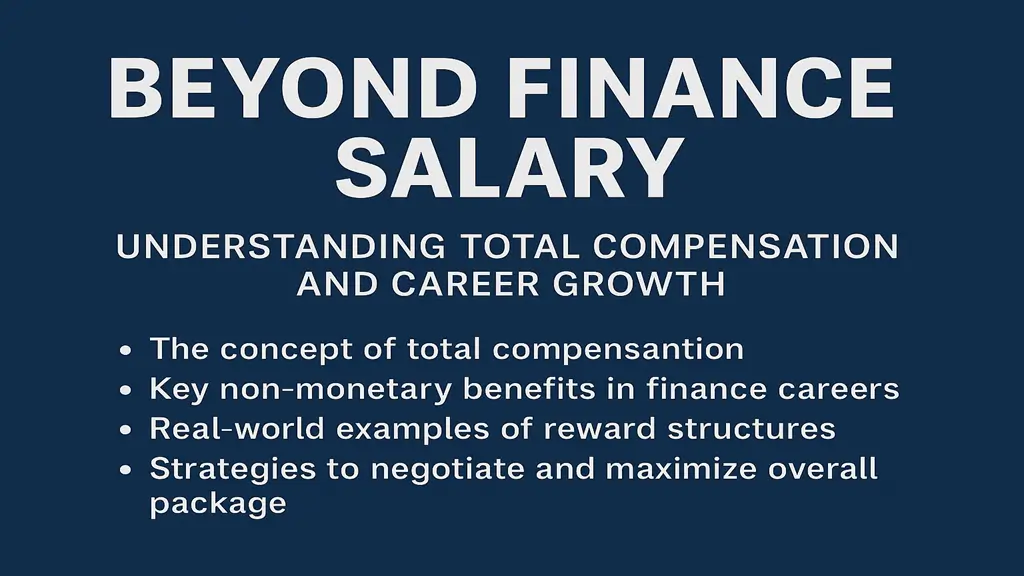
When people talk about beyond finance salary, they often focus solely on the base pay. However, total compensation in the finance industry—and indeed in any profession—extends far beyond your paycheck. In this exam-oriented discussion, we will explore:
- The concept of total compensation
- Key non-monetary benefits in finance careers
- Real-world examples of reward structures
- Strategies to negotiate and maximize overall package
- Career-growth implications tied to non-salary elements
This comprehensive analysis will equip you with both theoretical understanding and practical insights to excel in assignments and real-life negotiations.
1. Defining Total Compensation
Total compensation comprises all the rewards an employee receives in exchange for their labor. It includes:
- Base Salary: Fixed annual pay
- Variable Pay: Bonuses, commissions, profit-sharing
- Benefits: Health insurance, retirement plans, paid time off
- Perks: Professional development, flexible hours, wellness programs
- Equity & Long-Term Incentives: Stock options, RSUs
Focusing solely on base salary can mislead aspirants; a holistic view reveals the true value of a finance role.
2. Core Components of Finance Salary
In finance roles, base salary often represents 50–70% of total cash compensation. The remainder comes from:
| Component | Typical % of Total Cash Compensation |
|---|---|
| Base Salary | 50–70% |
| Annual Bonus | 20–40% |
| Commissions (if any) | 0–20% |
| Profit-Sharing | 0–10% |
Example: A mid-level financial analyst with a ₹10 LPA base might receive a ₹2 L bonus (20%) plus ₹1 L in profit-share (10%), making total cash ₹13 LPA.
3. Non-Monetary Benefits: The “Beyond Salary” Elements
Non-monetary benefits often differentiate top employers. Key elements include:
| Benefit Category | Examples | Value Proposition |
|---|---|---|
| Health & Wellness | Medical, dental, mental-health coverage | Reduces out-of-pocket expenses |
| Retirement & Financial | Provident fund contributions, pension plans | Secures long-term financial well-being |
| Work–Life Balance | Flexible hours, remote work options | Improves productivity and retention |
| Learning & Development | Certifications, training budget | Enhances skills and future earning power |
| Recognition & Culture | Awards, team retreats, mentorship programs | Boosts engagement and career growth |
| Equity & Ownership | Stock options, RSUs | Aligns employee interests with company |
Real-World Application: Goldman Sachs offers comprehensive mental-health coverage and an annual learning stipend—critical for sustaining high performance under stress.
4. Case Study: Investment Banker vs. Corporate Finance Analyst
| Feature | Investment Banker | Corporate Finance Analyst |
|---|---|---|
| Base Salary (₹) | 25 L – 35 L | 10 L – 15 L |
| Annual Bonus (% of base) | 50–100% | 20–40% |
| Work–Life Balance | Low (70–80 hrs/wk) | Moderate (50 hrs/wk) |
| Learning Opportunities | High—deal exposure, client calls | Moderate—internal FP&A projects |
| Long-Term Incentives | Significant—stock options | Limited |
| Non-Monetary Perks | Exclusive events, networking | Training programs, wellness days |
Analysis: While bankers command higher cash compensation, analysts may enjoy better work–life balance and structured career development—crucial “beyond salary” considerations.
5. Strategies to Maximize Total Compensation
- Benchmark Industry Standards: Use sites like Glassdoor to compare total compensation packages.
- Leverage Certifications: A CFA charter can boost base salary by 10–15% and unlock higher bonuses.
- Negotiate Holistically: Ask for increased training budget or flexible work instead of marginal salary bump.
- Demonstrate Impact: Quantify cost savings or revenue generation in performance reviews to justify higher variable pay.
- Timing of Negotiation: Aim discussions after major project successes or during annual compensation reviews.
Example Script:
“Based on my contributions in reducing treasury costs by 12% this quarter, I’d like to discuss adjusting my bonus target and adding an annual certification allowance.”
Frequently Asked Questions (FAQs)
Q1: Is base salary more important than bonuses?
A1: Both matter—but bonuses fluctuate. A higher base provides stability; aim for a balanced mix.
Q2: How do I value stock options?
A2: Estimate future share price and vesting schedule. Discount for risk and vesting period to calculate present value.
Q3: What non-monetary benefit yields the greatest ROI?
A3: Learning & development budgets. New skills directly translate into higher future earnings.
Q4: Should I join a startup or established bank?
A4: Startups may offer more equity upside; banks deliver structured bonuses and training. Choose based on risk appetite.
Q5: When’s the best time to negotiate?
A5: After a successful project or annual review cycle—when your value is most evident.
As a finance news writer at sirfal.com, I specialize in breaking down complex economic trends, market updates, and investment strategies into clear, actionable insights. My mission is to empower readers with the knowledge needed to make informed financial decisions. Thank you for engaging with my articles; I hope they add value to your financial journey.